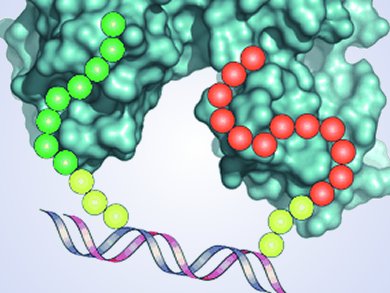The production of antibodies for biomedical research is expensive, time consuming, and can fail for many targets. Synthetic antibodies that consist of a high affinity capture reagent created from two weak affinity segments on a synthetic scaffold are one possible alternative to natural antibodies.
John Chaput and colleagues, Arizona State University, USA, have produced DNA synbodies (synthetic antibodies) from readily available peptides by a process called ligand interactions by nucleotide conjugates (LINC). LINC uses a short double-stranded DNA scaffold to determine the optimal separation distance and angular geometry needed to transform two ligands into a high affinity protein capture reagent.
Such capture reagents are vital for revealing the subtleties of protein function, and may pave the way for improved methods of detecting and treating a broad range of diseases.
Image: © Wiley-VCH
- Generating DNA Synbodies from Previously Discovered Peptides
R. Liu, B. Jiang, H. Yu, J. C. Chaput,
ChemBioChem 2011, 12(12), 1813—1817.
DOI: 10.1002/cbic.201100284




